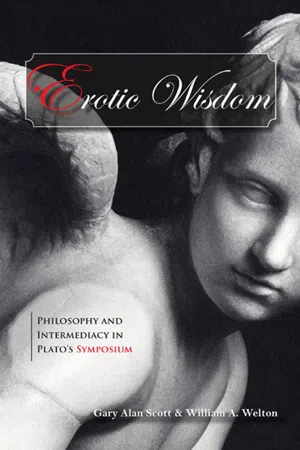
Erotic Wisdom
Philosophy and Intermediacy in Plato's Symposium
- 297 pages
- English
- PDF
- Available on iOS & Android
About this book
A lively and highly readable commentary on one of Plato's most beloved dialogues.
Erotic Wisdom provides a careful reading of one of Plato's most beloved dialogues, the Symposium, which explores the nature and scope of human desire (erôs). Gary Alan Scott and William A. Welton engage all of the dialogue's major themes, devoting special attention to illuminating Plato's conception of philosophy. In the Symposium, Plato situates philosophy in an intermediate (metaxu) position-between need and resource, ignorance and knowledge-showing how the very lack of what one desires can become a guiding form of contact with the objects of human desire. The authors examine the concept of intermediacy in relation both to Platonic metaphysics and to Plato's moral psychology, arguing that philosophy, for Plato, is properly understood as a kind of "being in-between, " as the love of wisdom (philosophia) rather than the possession of it.
Frequently asked questions
- Essential is ideal for learners and professionals who enjoy exploring a wide range of subjects. Access the Essential Library with 800,000+ trusted titles and best-sellers across business, personal growth, and the humanities. Includes unlimited reading time and Standard Read Aloud voice.
- Complete: Perfect for advanced learners and researchers needing full, unrestricted access. Unlock 1.4M+ books across hundreds of subjects, including academic and specialized titles. The Complete Plan also includes advanced features like Premium Read Aloud and Research Assistant.
Please note we cannot support devices running on iOS 13 and Android 7 or earlier. Learn more about using the app.
Information
Table of contents
- Erotic Wisdom
- Contents
- Acknowledgments
- Introduction
- 1. Introductory Dialogue (172a–178a)
- 2. Six Speeches on Love (Erôs)
- 3. The Entrance and Speech of Alcibiades (212c–222c)
- 4. Conclusion
- Appendix: Intermediacy,Philosophy, and Recollection
- Notes
- Works Cited
- Index